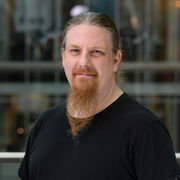Dr James Mapp
School of Computer Science
University Teacher
Discipline and Appeals Lead


+44 114 222 1843
Full contact details
School of Computer Science
Regent Court (CS)
211 Portobello
Sheffield
S1 4DP
- Profile
-
James is a teaching focussed Computer Science generalist with interests in machine and computer vision, Digital Systems Design, and applied computing (ecology and conservation). James has several years of teaching hardware oriented subjects (digital electronics, architectures, networks, etc.), and analysis topics (computing for business, systems analysis and development). Outside of teaching, James has significant experience with Issues surrounding academic integrity, regulation, and disciplinary procedures; as well as experience with student engagement and circumstances monitoring.
James is Ph.D graduate from the University of East Anglia's School of Computer Sciences; with research in applied computer vision, and application to biological image analysis. Research collaborations during this period included: The Centre for Environment, Fisheries and Aquaculture Science, Lowestoft (Cefas); and Diamond Light Source Ltd, Harwell. Prior to Ph.D studies, James completed a dissertation on the use of real-time lip reading systems, collaborating with research units within the University of Surrey, and the Home Office Strategic Development Branch. This was undertaken during a Masters in computing (MComp) Degree, which followed an Applied Computing science degree, with applications in ecology and conservation.
Before returning to academia, James worked as a tailor, assisting in the construction of bespoke suits for celebrity clients and Hollywood productions.
- Research interests
-
As a Computer Science generalist, James' research interests surround the application of computer vision and machine learning techniques to problems in the wider sciences. Outside of subject-related research, James' interests are focused on the use of generative AI in academia, particularly in areas of academic integrity, and responsible/ethical use.
